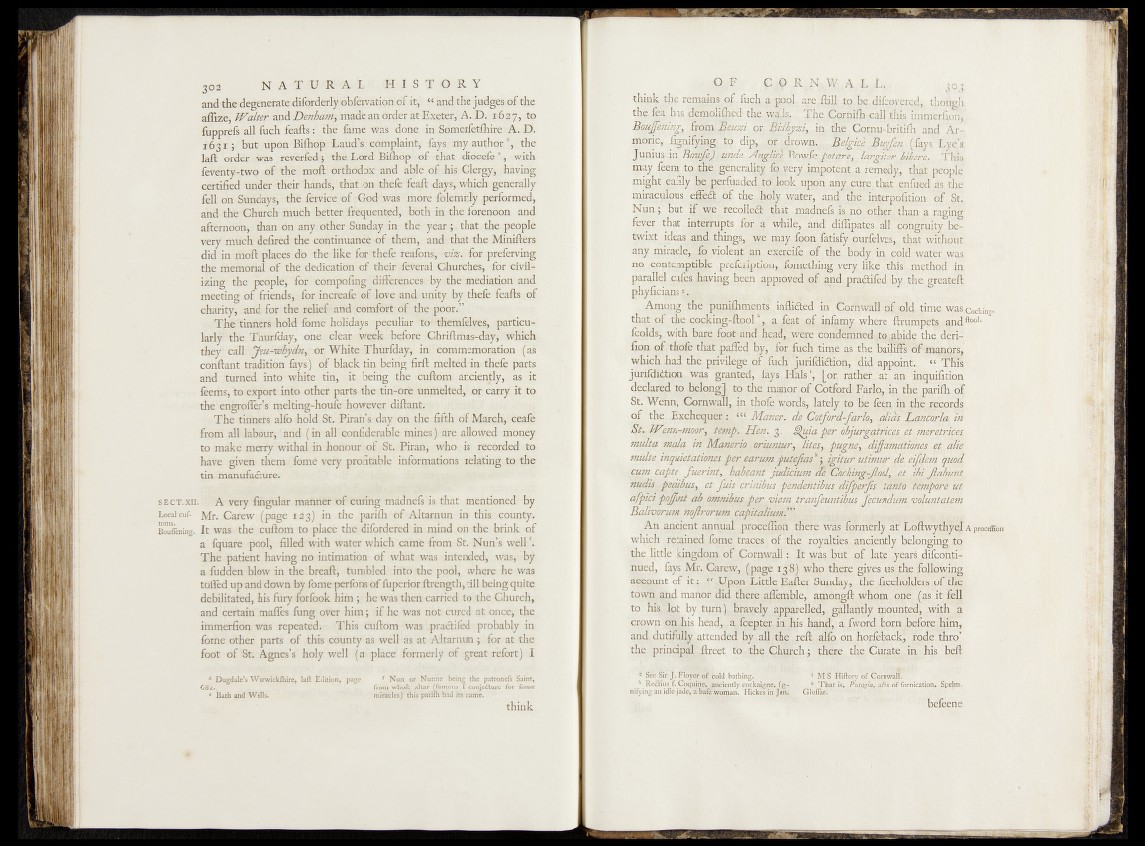
and the degenerate difearderlytobf&vatiQffictf it,; « andfKte'judges.of the
aflize, Walter and Denhani, made an order art Exeter, A/ D. 16 27, to
fupprefs all fiich the feme was done in Sdsnecfetflaire A. D.
j but upon Bifhop fays' my author ?,fthe
laft order was reverfed; the, Lord Bifhop of that diocefc', with
feifohty-two ©f the moft orthodox 'and able| of; his Clergy* ; having
feferijpfed raider their hands, that, on thefe Feaft days, which generally
fell on Sucftdays, the fervice ‘of •■ ^rod’was more fblemnfy performed,
and tbb Church touch better frequented, both in the forenoon and
afternoon, than On any; other Sunday in the year; that the people
very xntseh defiied the eoUtinuantfe of^ theih, and that the MinMers
did in rnolt places do the like for thefe reafons,-’*»*. for preferving
the memorial of the dedicatibn of their feveral Churches, for civilizing
the people, for eompofing diffebnces.rl^rthe mediation and
meeting o f friends, for increafe ofloye and unity by thefe feafts of
charity, and for the relief and comfort bf the-poor.”
The" tinners hold fome holidays peculiar tkemfelves, particun
larly'thc Thurfiiay, one dear week before Chriftbas^dayy which
they' call Jeu-wbydn, or White Thurfday, in commemoration (ai
conftant tradition fays) of black tin Beifig firft melted in thefe parts
and turned into white tin, it being the cuftom anciently,Aas it
ferns, to export into other parts the tin-ore unmelted, or cafry it to
the engrofler’s meldng-houfe however diflant.
The tiiinets alfo hold St. Piran’s day on thefifth of Mareh, ceafe
from all labour,' and (in all confiderable mines) areallowed money
to make merry withal in honour- of- St. Piran, who is recorded to
have given them fome very profitable informations relating to the
tin-manufabture.
sect.xii. A very fihgular manner of curing madnefs is that mentioned by
Localcuf- jy[r> Carew (page 123) in the parifh ofiAltarnun in this county.
Bouflening. It was the cuftom to place the difordered in mind on the brink of
a fquare pool, filled with water which came from St. Nun’s wellf.
The patient having no intimation of what was intended,, was,* by
a fudden blow in the bread, tumbled into the pool, where he was
tolled up and down by fomeperfons of fuperior ftrength, till being quite
debilitated, his fury foriook him; he was then carried to the Church,
and certain mafles lung over him; if he Was not cured at once, the
immerfion was repeated.- This cuftom was pradtifed probably in
fome other parts of this county as well as at Altarnun j for at the
foot of St: Agnes’s holy well (a place formerly of great refort) I 4
4 Dugdale’s Warwickfhire, laft Edition, page r Nun or Nunne' being the pstronefs Saint,
682., ■ f from whofe" altar (famous..1 conjefture for fome
* Bath and Wells. miracles)' this parilh had iis-naiiie.
think
think the. remains of .fuch a pool areitill to be difccyered, though
the fea has demojifliai the walls. The Coruiih call this immerfion»’
Boujfetiing,. {rom^mtzi or. Bidbyzi, in the Coxnu-britifh and Ar-
moric, fignifying to dip, or rdrown. JjeWS^u^/M, ({ays Lye’s
Junius in. Btwfe) uunde. Jlnglice &owk.ptare, , iargiterMbere. This
may feem to the generality fo. very inipotent a remedy, tfiat people
might eafily be perfuaded. to lo ^ upon any..pure, that cnfucd as the
miraculous effebt of the holy water, and the ‘Wrpc^tion oOt.
Nun ^ u t if^^pTeco]Ie|i^^at, .madncfslLno otpqr t,han g paging' '
fever that interrupts for a while, and diffipates all cdngruily betwixt
ideas and things, we may foon fatisfy ourfelyes, that without
any miracle, fo violent an exercife of the body in cold water was
no contemptible prefcription, fomething very like this method in
parallel caies having been approved of and prabtifed by the greateif
phyficians |.
Among the punifhmen^ inflibted in Cornwall of -pj ci fini^ W^fcocki^ - -
that pf the coc^ir^-ftpol infemy, wh^e ftrumpets j ap'dftoofir
foqlds^ with bare foot^nd hegd^wlje cbjwem'tied^q ,gMde theam- -
fipn of-thofe that .paffecj by? for |uch tjrqe' aS the bantu's'‘of 'manors,
which had the privilege of fuch jyrifdibtiQn, did appoint. “ T®
jurifdibtion wa^ granted, Jays^ltjns1, [or, rather at, an inqnifition
declared to belong] to the manor of Cotford Farlo, in fhe parifh of
St. Worn, Cornwall, in thpljb words, Iqtejy.yp be feep, fnThfi^pcords
of thp Exchdqu^,:, (‘j lifaner.. dp alias ‘fjjfyciir/fa bt
S t . W e jin -m o o r r temp, Hett. 3 . - ^uia pet ohjiirgaigicey, ef pieretnic.es.
miilta mala in Manerio . oriunturx liter, pugjie, dijfamatio?p,s et .alie.
multe inquietatimes per earuin putejias kyigitur utimur. de, eifij,em quod
cum cape Juerint, habeant judicium de Vorlrnsr-dnaL ,e£ M i flubunt
nadir, pedibm, ct fuis cnnibus pendentibus difpejjis tdht'o ■ ' ' up
afpici pbjjint ab omnibus per, viam tranfpitihm ■ Jecundum. cooluntatem
Balivorum nojlrorum capitalium? ’ ’.
An ancient annual proceffion there was formerly at Loftwythyel a proceffion
which retained fome traces of the royalties anciently belonging to
the little kingdom of Cornwall: It was but of late ..years difconti-
nued, fays Mr. Carew, (page 138) who there giyes mt^,fo|lpwing
account of it: <c,Upon Little Eafter dnpday^ .the jft.cchoiders,of tKe
town and manor did there.aflemble, ambngft whom. one. (as it fell
to his fot by turn) bravely apparelled, gallantly m°vnted, with ^
crown pdjbis head,-,a,fcepter.in.{his hand, a fword-.born’ bfifo^
and dutifufly attended by all.th^refi^qlip on jrode thro’
the principal ftreet to the Church; there the Curate in his beft
B See Sir: J. Floyer of febld bathin^SS
t h Re£l*ius f. Coquine, anciently cockaig^e', figq
lifying an idle jade, a bafe woman. Hiekes in Juh.
1 M'S Htftory of Cornwall.
k That is, Put agio $ 'a^fs^of fornication, Sjpelm
beleene